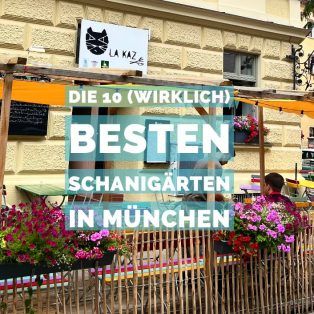
Aktuell, Die 10 wirklich besten..., English, Essen, Stadt
10 Places for Bavarian Cuisine
- Münchens Startup-Szene: Im Gespräch mit Prof. Dr. Helmut Schönenberger - 25. August 2021
- Welcome to Isar Valley: Warum ist München bei IT-Firmen so beliebt? - 4. August 2021
- 10 Museums you should visit in Munich - 14. Juli 2021
Pretzels and beer, the peanut butter and jelly of Bavaria. Although a glutinous gateway to Bavarian cuisine, they are not the only thing that defines it.
Bavarian cuisine does not deceive: it’s oily, smoky, juicy, piquant and pungent. It is a cuisine for the simple life. One thing it however is not: stereotypical. The image of pretzels and beer gives the appearance that Bavarian cuisine is imprisoned in an Oktoberfest tent on High Street. That’s misleading. Tradition is valued, but not prioritised. What always comes first is: the richness of the broth, the acidity of the sauerkraut, the crunchiness of the fried breading and fluffiness of the dough.
This list makes an attempt to showcase the tradition, the seasonality, the sustainability and the innovation of real Bavarian cuisine:
Wirtshaus Obacht
Bavarian food modernised with moderation. Wirtshaus Obacht opened its doors in 2017, but already it has already become a homely hang-out for the residents of Maxvorstadt. Typically, they meet for the Southern German food of Bavaria, but also Swabia and Baden: from “Wienerle” to “Sauerbraten”. The modern combination of thinly sliced meat with fresh vegetables or tangy fruit makes the notoriously heavy German food seem light. You don’t like people? Eat your Knödel next to Wirtshaus Obacht’s public bookshelf.
And if you don’t like meat? That’s fine too. For chef Jochen, vegetarian options are not just an “alternative”, they are a real chance to redefine what Bavarian cuisine is supposed to mean. For example: smoked tofu from Bavarian soy beans with eggs, sauerkraut and radish. The menu accompanies the names of the Bavarian farms which grow the soy or the lentils. Wirtshaus Obacht will surprise.
Wirtshaus Obacht, Schwindstraße 20
Bazi’s Schlemmerkucherl
Bavarian Fast Food? Open until 22:00, and a little bit thereafter, Bazi’s Schlemmerkucherl is an oasis for late-night snackers. Perhaps a box of roast pork with Knödel and red cabbage covered in hot gravy doesn’t count as a snack, but that’s quickly forgotten the next morning. Perhaps the only image that remains is that of Bazi’s counter: the two oily plates of roast pork and a bare black chalk board on top. With only around six dishes, Bazis Schlemmerkucherl is known for its affordable, honest but most importantly crunchy roast pork. On a cold night around Sendlinger Tor, you will always find what you didn’t know you needed.
Bazi’s Schlemmerkucherl, Müllerstraße 43
Zum Kloster
Seasonality is the charm of Zum Kloster. It shows that the balance between menu changes and the preservation of tradition is not a case of either-or. It’s roast pork combined with zesty juniper-red wine sauce. In spring you can sit outside and watch the cherry blossom trees on the calm end of the Preysingstraße. From here, Munich resembles a small, alpine village. In winter you can curl up in the wooden livingroom-like interior and slurp hot beet soup. Although a few classics remain, as the seasons change so does this small one-page menu. Every dish surprises and is exceptional. The Bavarian cuisine of Zum Kloster is not one of boring, stagnant tradition but one that changes and creates something unique, every month of the year.
Zum Kloster, Preysingstraße 77
Gaststätte Großmarkthalle
When something prides itself on not having changed, it better be good. The Weißwurst of Gaststätte Großmarkthalle is. Known for having the best in the city, when you walk through the spacious halls of the Gaststätte Großmarkthalle you see white ceramic pots and brown pleaded bread baskets. The plates of the guests look almost empty, were it not for the Weißwurst with a pretzel and a dab of sweet mustard. It looks more like a brunch, and indeed there has been a local trend to have brunch here on Saturdays from 7:00 bis 13:00. Bavarian cuisine can be minimalistic.
Gaststätte Großmarkthalle, Kochelseestraße 13
Neuhauser Augustiner
Classical ambience. The answer to why so many Munich inns take the name of Augustiner lies at the bottom of the keg. With the name Augustiner, these inns are able to serve beer from Augustiner Bräu, the oldest brewery in Munich. Each inn carries this name with pride and the enticing offer of one of the best beers in Germany.
In line with tradition, Neuhauser Augustiner’s aim is not surprise but to keep it simple. The Bavarian adjective “urig” is fitting. It describes a place which is quaint and adheres to tradition in style and in atmosphere. This too can be said of this small beer garden which serves all the classics.
Neuhauser Augustiner, Hübnerstraße 23
Klinglwirt
Organic Bavarian Cuisine with a history. 80% of the menu at Klinglwirt is made up of organic dishes. Its back-page shows you the names of the farms it sources its meat, fish, eggs and vegetables from.
Engaged in initiatives for climate change and sustainability, you would think that Klinglwirt wants to be chic and modern, but Sonja Obermeier traces her family history in gastronomy back to 1905. Their weekly menu is full of creativity and seasonality. And you can also get the classics: For dessert, every Sunday they serve crunchy, caramelised Kaiserschmarrn, with powdery sugar and organic apple sauce.
Klinglwirt, Balanstraße 16
Görreshof
Schnitzel from Munich: Münchner Schnitzel is a thin pork steak, breaded in spicy horse radish and sweet mustard, then fried to perfection. Görreshof makes some of the best in Munich. German food is notoriously heavy, but when a restaurant can make it seem light you have made a good choice. Whereas other restaurants have monthly or weekly menus, Görresshof has a daily menu. In spring, the daily menu is a good tip for fans of wild garlic, the spicy scent you smell when you jog around the English Garden.
Görreshof, Görresstraße 38
Andy’s Krablergarten
A contender for the best Bavarian Schnitzel in Munich. The size of the Schnitzel at Andy’s Krabblergarten is hard to top. And then there is the vast selection not of food, but of Schnitzel. Bavarian Schnitzel marinated in a sweet mustard, a Munich-type Schnitzel covered in horse radish and Schnitzel with the spicy Bavarian cream cheese Obazda. All are served with plenty of refreshingly cold and sour potato salad. Bavarian tastes expressed through one dish.
Andy’s Krablergarten, Thalkirchner Straße 2
Schiller Bräu
Home brewery and high-end Bavarian cuisine. A rustic cuisine with stringy, cheesy Spätzle in the style of the Allgäu region. Most dishes are served in a hot pan and, most importantly, the Schiller Bräu beer. There is even a monthly menu dedicated only to its speciality beer. On the other hand, Schiller Bräu is a tad expensive. The locals therefore mostly come here on special occasions, to share the filled cast-iron sheets of the slowly, slowly roasted pork and braised beef.
Schiller Bräu, Schillerstraße 23
Café Frischhut
Bavarian Dessert: last but not least. For desserts, there is hardly anything more reminiscent of Munich than Schmalznudel. Dough is dipped into hot peanut oil, cooled down to a crispy gold and still warm it’s then passed onto a plate and served. Kind of like a Bavarian Donut.
Café Frischhut, Prälat-Zistl-Straße 8




No Comments